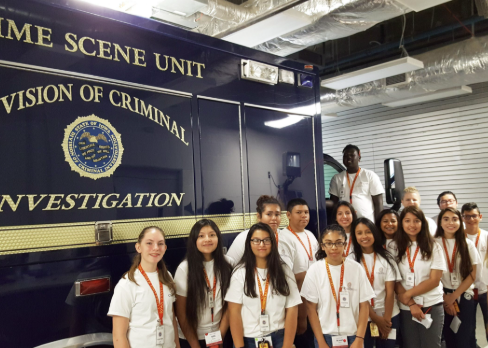High school is a time for exploration and laying the groundwork for future career paths, and for those intrigued by the world of law, justice, and investigative work, Forensics and Criminal Justice programs offer an exciting opportunity to delve into these fields. These specialized programs provide students with foundational knowledge, skills, and hands-on experiences that open doors to rewarding careers in law enforcement, criminal investigations, and more.
What Are Forensics and Criminal Justice High School Programs?
Forensics and Criminal Justice programs at the high school level are designed to give students an introductory understanding of the criminal justice system, crime scene investigation, forensic science, and law enforcement practices. These programs often include both theoretical coursework and practical experiences, offering students a blend of knowledge and real-world insights into the criminal justice field. Whether you’re curious about how law enforcement agencies work or are fascinated by the science behind crime-solving, these programs offer a dynamic way to explore these topics.
Key Subjects Covered in These Programs:
Introduction to Criminal Justice
This subject gives students an overview of the criminal justice system, including law enforcement, courts, corrections, and the role of each in maintaining societal order. Students will learn about criminal law, the legal process, and the ethical considerations involved in law enforcement.Crime Scene Investigation (CSI) Techniques
CSI is one of the most thrilling aspects of forensics. Students learn about collecting evidence, fingerprint analysis, DNA testing, and crime scene protocols. Hands-on activities, such as mock crime scene investigations, help students practice real-life skills used by professionals.Forensic Science
Forensic science involves applying scientific methods to solve crimes. Students study topics like biology, chemistry, and physics, learning how these disciplines apply to forensic investigations. Lessons often include examining case studies of famous criminal cases.Criminal Law and Ethics
Understanding criminal law and the ethical responsibilities of law enforcement professionals is crucial. Students discuss various types of crimes, legal rights, criminal procedures, and the impact of justice on society.
Why Should Students Consider a Forensics or Criminal Justice Program?
Exploring Career Opportunities
Early exposure to forensics and criminal justice allows students to understand the wide range of career opportunities in the field. Graduates may go on to pursue careers as detectives, forensic scientists, criminal lawyers, or even work in cybersecurity or private investigation.Building Problem-Solving Skills
These programs teach students to approach problems logically and methodically, skills that are valuable in any profession. The critical thinking and problem-solving techniques learned through criminal justice studies can be applied to many areas of life.Hands-on Learning
The programs often include opportunities for hands-on experiences, such as internships with local law enforcement agencies or crime scene simulations, where students can apply what they’ve learned in real-world scenarios.Preparation for Higher Education
Forensics and criminal justice programs can also prepare students for college or university courses in criminal justice, forensic science, law, or related fields. The foundational knowledge gained can give them a head start when they move on to higher education.
Conclusion:
If you’re a high school student interested in crime-solving, justice, or law enforcement, enrolling in a Forensics and Criminal Justice program might be the perfect way to kick-start your future career. Not only will you gain valuable skills and knowledge, but you’ll also set yourself apart as a motivated and curious learner, ready to take on challenges in the fascinating world of criminal justice.














